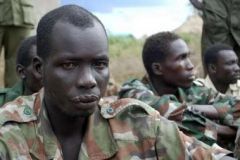UN tries to calm Sudan’s Upper Nile after clashes
Nov 29, 2006 (UNITED NATIONS) — U.N. Secretary-General Kofi Annan expressed deep concern on Wednesday about heavy fighting between Sudan’s army and former rebels in southern Sudan, where a peace pact had ended a 21-year-old civil war.
 The clashes, on Monday and Tuesday, were in the town of Malakal in Upper Nile State among soldiers in an integrated unit of the Sudanese army and the Southern Peoples Liberation Army, the one-time rebels in the south.
The clashes, on Monday and Tuesday, were in the town of Malakal in Upper Nile State among soldiers in an integrated unit of the Sudanese army and the Southern Peoples Liberation Army, the one-time rebels in the south.
According to U.N. reports, Maj. Gen. Gabriel Tang of the Sudanese Armed Forces, attacked two SPLA soldiers, killing one and injuring another. In turn, SPLA troops attacked Tang’s house and occupied it.
U.N. officials in Sudan said they did not know the number of casualties on both sides but relocated some 240 civilian staff. Annan said that U.N. commanders along with a delegation of SPLA and Sudanese army officers were now in Malakal to calm the dispute.
“While the situation in Malakal is relatively calm (on Wednesday), tension remains,” Annan said in a statement issued by a spokesman. He said he was “deeply concerned” about the clashes, which were a “serious violation of the security arrangements of the Comprehensive Peace Agreement.”
That agreement, signed in January 2005 agreement, between the Khartoum government and the southern Sudan People’s Liberation Movement includes power and wealth sharing and integrating security forces.
But some of the basic tenets, including election planning and dividing oil revenues, have not been met.
The United Nations has some 10,000 peacekeepers in the south to monitor the agreement and help train police, human rights workers and provide other services.
The southern conflict is separate from violence in the western region of Darfur, where U.N. peacekeepers are not permitted, and where an estimated 200,000 people have been killed and 2.5 million have been forced to flee their homes since 2003.
(Reuters)
